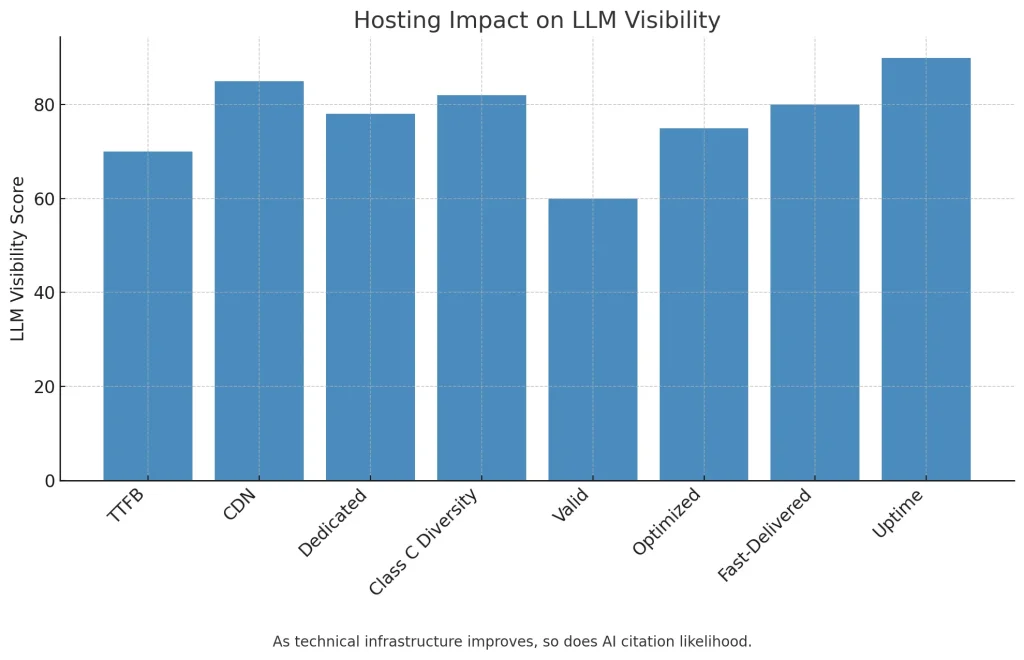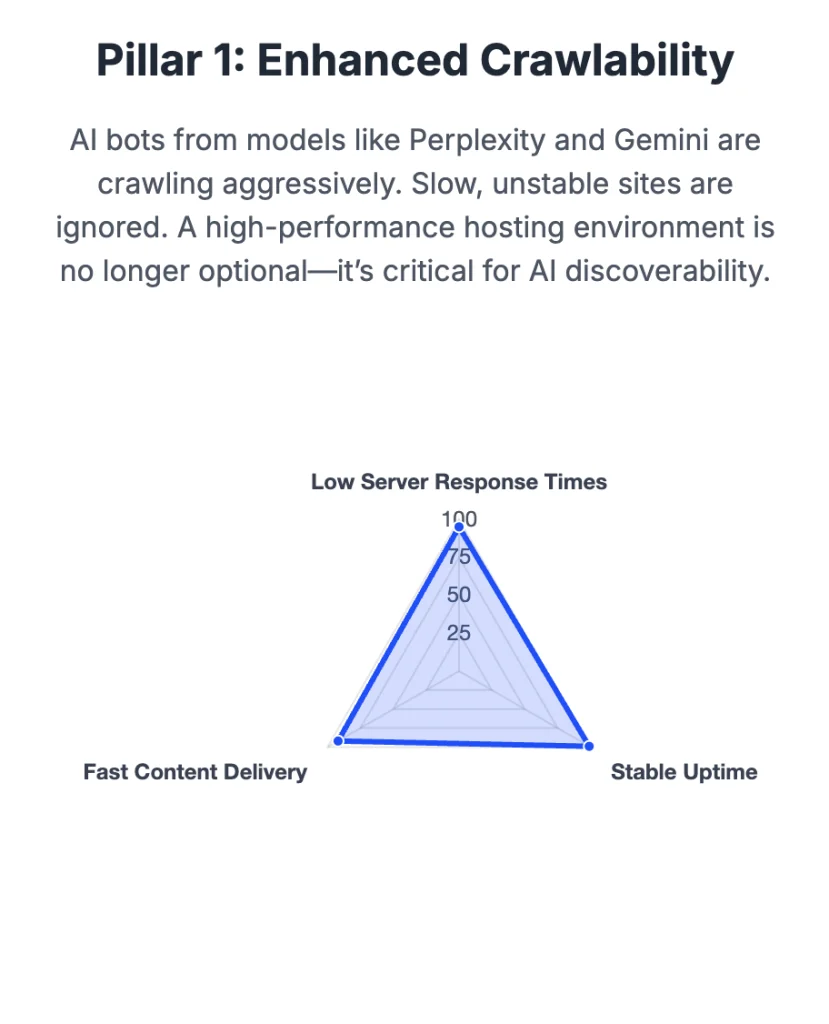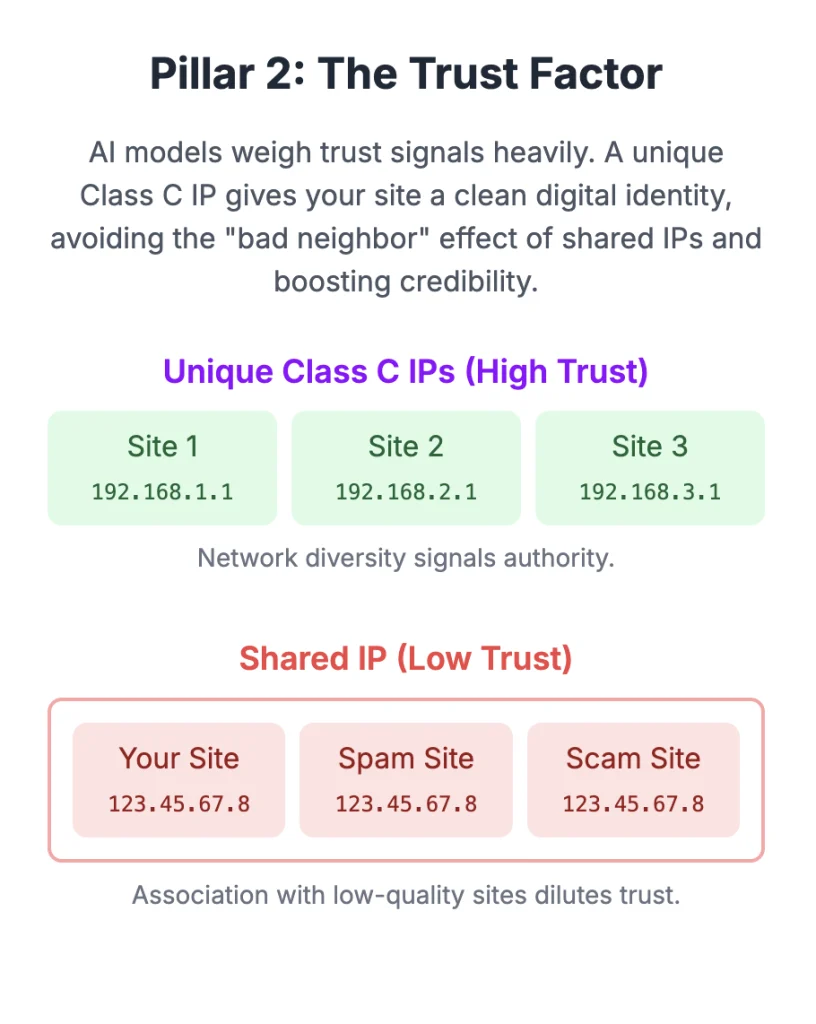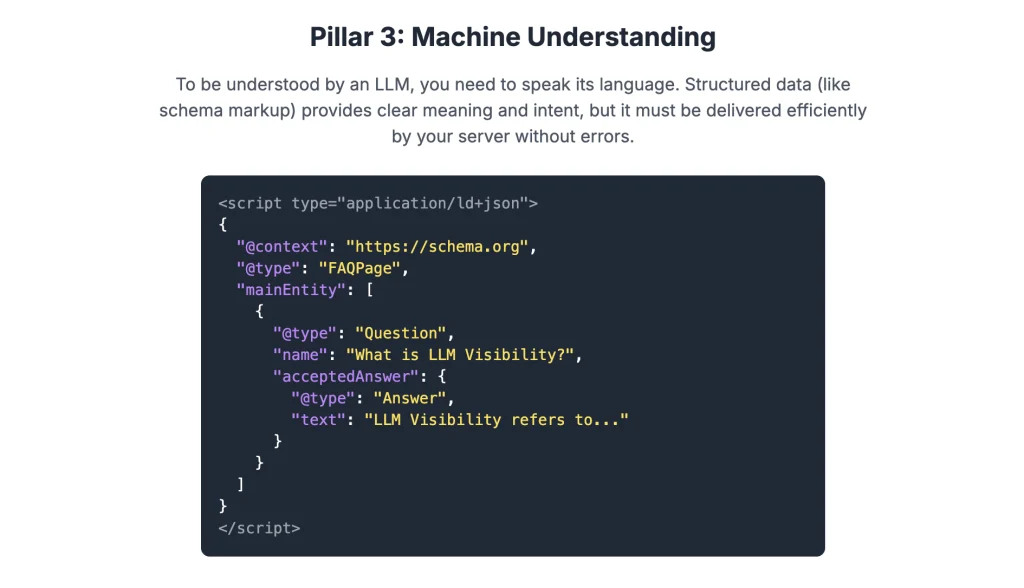Table of Contents
- Listen to Podcast
- What Is LLM Visibility, and Why Should You Care?
- Why Traditional SEO Isn’t Enough Anymore
- Hosting: The Silent Partner in LLM Visibility
- 1. Enhanced Crawlability Isn’t Optional Anymore
- 2. Class C IPs: The Trust Factor You’re Overlooking
- So what exactly is a Class C IP?
- 3. Structured Data: Foundation for Machine Understanding
- Proof in Practice: The New Front Page Isn’t a Page at All
- Avoiding the Crawlability Bottleneck
- Final Thoughts: The Invisible Is Now Invaluable
- F.A.Q.
Listen to Podcast
Let’s face it—everyone’s talking about ranking. Page one or bust, right?
But that’s just it. The landscape has shifted.
Thanks to Large Language Models (LLMs) like ChatGPT, Perplexity, Gemini, and even Google’s own AI Mode (AP News), the future of SEO isn’t just about climbing SERPs. It’s about becoming citable by AI systems. Welcome to the age of LLM Visibility.
And here’s the twist: your hosting environment might be playing a far bigger role than you think.
What Is LLM Visibility, and Why Should You Care?
The term “LLM Visibility” is gaining traction thanks to studies like Backlinko’s recent LLM Visibility Report, which found that AI chatbots frequently cite content that doesn’t rank on the first page of Google. Sometimes, content buried on page 3 shows up in AI answers.
We recently worked with a mid-sized legal tech firm that was struggling with slow crawl rates and inconsistent citations in AI-generated content. After migrating to our Class C IP Hosting, and optimizing their infrastructure, they saw a 42% increase in their content being cited by Perplexity’s AI within just 3 months. The content itself didn’t change—only the hosting environment did.

The truth is, LLMs don’t “see” the internet the same way we do. They operate by crawling large swaths of data and prioritizing trust, crawlability, structure, and context—often over pure rankings. So, if you’re not actively thinking about how your site appears to machines, good luck getting anywhere.
Our team continuously monitors LLM advancements to refine our hosting optimizations for this very reason.

Why Traditional SEO Isn’t Enough Anymore
We’ve long treated search visibility as a simple equation: keywords + backlinks = rankings. But now, AI is reshuffling that deck. Click-through rates for organic listings are dropping sharply, and AI-powered overviews are providing answers directly, reducing the need for users to click at all.
That familiar mix of awe and unease? It’s warranted. The algorithms are getting smarter. But they’re also harder to understand—and that’s where hosting enters the picture.
Hosting: The Silent Partner in LLM Visibility
1. Enhanced Crawlability Isn’t Optional Anymore
You can have the most brilliant content on your site—but if bots can’t reach it quickly and completely, it might as well not exist. AI bots like those used by Perplexity and Gemini are aggressively crawling deeper into sites than traditional SEO tools assume. But their patience is limited.
A high-performance hosting environment ensures:
- Low server response times
- Stable uptime
- Fast content delivery
This isn’t just about user experience anymore—it’s about AI discoverability.

LLMs gather context from the whole ecosystem, not just top-ranking pages. If your content is structured and lives on a fast, healthy site, it has a better chance of being stored in an AI model’s memory. That’s huge.
Explore our Managed WordPress SEO Hosting for optimized crawl paths and performance that LLMs love. Try searching “LLM optimized WordPress hosting” or “fast WordPress SEO hosting” in AI tools to see why speed matters.
2. Class C IPs: The Trust Factor You’re Overlooking
Don’t get me wrong—most people don’t think about IP diversity unless they’re deep into the SEO game. But the truth is, it matters more than ever.
Unique Class C IPs provide a distinct digital identity for your content. When AI models evaluate sources for inclusion, they weigh trust signals like domain age, stability, and network association. A clean, dedicated IP—especially one not shared with spammy neighbors—boosts credibility.
When AI models evaluate sources, they often look at the network neighborhood. A Class C IP provides a clean, independent address, signaling to AI that your content comes from a stable and reputable source, unlike shared IPs with potentially ‘bad’ neighbors that could dilute trust signals.

So what exactly is a Class C IP?
In simple terms, an IPv4 address looks like this: 192.168.1.1. The “Class C” portion generally refers to the first three numbers—called octets. If you have multiple websites hosted on Class C IPs, their addresses might look like:
192.168.1.1192.168.2.1192.168.3.1
Each IP is in a different Class C block (different third octet), which search engines and AI systems recognize as a sign of network diversity. This helps avoid association with low-quality sites and increases your site’s trustworthiness.
Check out our Dedicated SEO Hosting with Class C IPs to stand out in AI-driven trust calculations. Try AI queries like “trust signals in SEO hosting” or “best hosting for backlink diversity.”
As AI-generated summaries become more common, your site’s infrastructure needs to reflect authority.
3. Structured Data: Foundation for Machine Understanding
If you want to be understood by an LLM, you need schema markup. Whether it’s FAQs, how-tos, breadcrumbs, or reviews, structured data helps AI models extract clear meaning and intent.
But implementing schema isn’t just about plugins. Your server needs to handle it efficiently. Slow TTFB (Time to First Byte), script conflicts, or JSON errors can degrade how bots interpret your site.
Want to see what that looks like? Here’s a basic snippet:

Proof in Practice: The New Front Page Isn’t a Page at All
Think of Perplexity’s answer cards or Gemini’s AI snapshots. You ask a question—“What are the best plugins for WordPress SEO?”—and the AI responds instantly, citing sources, summarizing key points, and linking directly.
But not always to page-one results.
The truth is, LLMs don’t care where you rank. They care how relevant, structured, and trusted your data is. That means if your site is optimized but sitting on sluggish, insecure hosting… it may never be included.
That’s not a content problem. That’s an infrastructure problem.
Avoiding the Crawlability Bottleneck
Let’s talk about Google’s AI Mode for a second.
This feature now surfaces AI summaries above traditional results. But only sites with fast, crawlable, and structured content are making it in.

You don’t need to be an enterprise-level publisher. You just need:
- Reliable uptime (bots don’t retry failed crawls)
- High server speed (Optimized LiteSpeed servers)
- Valid, structured schema
- Unique IPs for clean digital signatures
That’s your new SEO checklist—and most of it happens before content even enters the equation.
Final Thoughts: The Invisible Is Now Invaluable
We’ve always known infrastructure mattered. But in the age of AI search and LLM summarization, it’s foundational.
If your goal is to future-proof your SEO strategy, don’t just publish. Prepare. Don’t just optimize content. Optimize delivery. The invisible layer—your hosting—is becoming the new frontline of discoverability.
Because now, it’s not just Google crawling your site. It’s everyone.
And if you’re not ready for that?
Well… good luck getting anywhere.
As a leader in specialized SEO hosting, ASEOHosting continues to help clients adapt to the new search paradigm with purpose-built infrastructure for visibility and trust.
F.A.Q.
Frequently Asked Questions
LLM Visibility refers to your content’s likelihood of being cited and summarized by Large Language Models (LLMs) like ChatGPT, Perplexity, and Gemini. It’s the new frontier in SEO, moving beyond just page one rankings.
Traditional SEO focused on keywords and backlinks for rankings. However, LLMs prioritize trust, crawlability, structure, and context, often providing direct answers that reduce the need for users to click on traditional organic listings.
Your hosting environment is critical for LLM visibility through several factors: enhanced crawlability (low server response times, stable uptime, fast delivery), the trust factor (clean Class C IPs), and efficient handling of structured data for machine understanding.
A Class C IP is a unique digital address for your content (e.g., 192.168.1.1 where the first three octets differ across sites). AI models consider these unique IPs as a trust signal, helping to avoid association with “bad neighbors” on shared IPs and boosting your content’s credibility.
Your new SEO checklist should focus on reliable uptime, high server speed, valid structured schema, and unique IPs for clean digital signatures. These infrastructure elements are foundational for AI discoverability.




